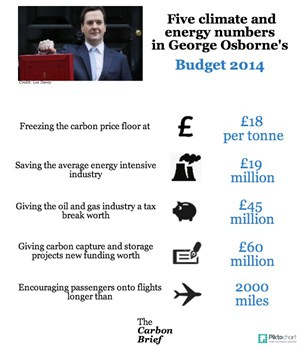Chancellor George Osborne delivered his fifth budget yesterday. It seems the chancellor has been taking notes from his party leader, with a number of measures squarely aimed at cutting the “green crap“.
We’ve picked out the five most important energy and climate change numbers.

Osborne announced the UK’s top-up carbon tax – the carbon price floor – will be frozen after 2016. The government only introduced the measure last year, and the price was intended to rise every 12 months – hitting £30 by 2020. That’s now not going to happen, and the chancellor said the government would review the policy altogether in 2020.
Environmental campaigners and commentators said yesterday’s decision gave a lifeline to the UK’s coal plants as it makes it cheaper for them to pollute.

The carbon price floor freeze wasn’t the only announcement that cut polluters’ costs. Osborne also announced a new compensation package for the UK’s energy intensive industries, which could save them £19 million on energy costs by the end of the decade.
Prior to the budget, energy minister Michael Fallon had called on the government to make it cheaper for industries that use a lot of energy – such as paper and cement manufacturers – to operate. He warned if the UK didn’t cut energy costs, these industries would move abroad.
Fallon’s remarks appear to have hit home. Yesterday Osborne announced the UK’s most polluting industries wouldn’t have to pay to support the development of the renewable energy sector – significantly cutting the industry’s energy bills.

Osborne also announced new tax breaks for North Sea oil and gas operators. The new tax rules could be worth £45 million by the end of the decade, Treasury analysis suggests.
In his speech, the chancellor said the government would do everything in its power to ensure the UK exploits “every drop of oil we can” from the region. But North Sea oil and gas is getting increasingly hard to access.
The tax break is designed to make it as cheap as possible for companies to operate and keep the industry going, using new technologies to access hard-to-reach resources.

But if the UK is going to keep extracting and burning fossil fuels while keeping to its legally binding climate target – as the chancellor seems adamant it will – it’s going to need carbon capture and storage (CCS) technology. With that in mind, Osborne pledged £60 million of new funding to help get the UK’s CCS industry up and running.
While that may sound like a lot, it’s not clear how far the money will stretch. After all, CCS projects have proven to be expensive undertakings so far.
The government just pledged £100 million for the first stage of two new CCS projects. It hopes they will be the first in a long line which will eventually deliver 12 gigawatts of CCS power by 2020. As the two projects currently funded would only deliver a little under 800 megawatts of power (if they work), the government needs the industry to get cracking if that’s going to be achieved.

It’s not just power sector emissions that are a concern, though. About 6 per cent of the UK’s emissions come from air travel. Nonetheless, the chancellor yesterday announced a tax break which could mean more people taking long-haul flights.
90 million passengers travelled on flights covering more than 4000 miles from the UK last year. As those flights use the most fuel, they get taxed the most – with companies passing that cost on to consumers.
But yesterday’s announcement should make those flights cheaper. That could mean more people getting long haul flights, the government says – and that means more emissions.
So all in all, yesterday’s budget had more for polluters than it did for those wanting to curb emissions and combat climate change.
If this budget is anything to go by, the chancellor is increasingly abandoning his party’s promise to lead the “greenest government ever” as next year’s election looms ever larger.


